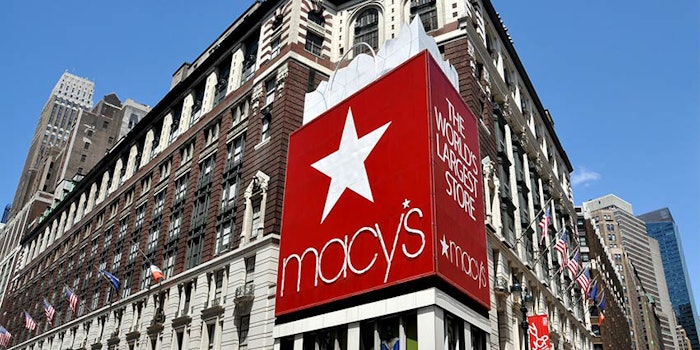
Macy's, which recently made some management changes and invested in an omnichannel strategy, has announced that it will close 100 stores as it refocuses its retail mix and reports that second quarter 2016 sales totaled $5.866 billion, a decrease of 3.9% compared with sales of $6.104 billion in the same period last year.
The difference between the year-over-year change in total and comparable sales largely resulted from the closing of 41 under-performing Macy’s stores in fiscal 2015, according to the company.
“We will continue to carefully analyze consumer shopping patterns and trends, and use data and customer insights as the basis for innovations to drive the business."
For the year to date, Macy’s, Inc. sales totaled $11.637 billion, down 5.7% from total sales of $12.336 billion in the first half of 2015.
In addition to closing 100 stores, Macy's will enhance the in-store shopping experience, add exclusive products and invest in its omnichannel strategy (website and apps). The closing stores have a combined sales total of $1 billion. Savings from the plan could offset any losses.
The omnichannel is critical as Macy’s is the sixth on an independently published list of America’s largest-volume online retailers.
The plan, as outlined by the retailer, includes:
- Maintaining a "significant" bricks-and-mortar presence in 49 of the top 50 U.S. markets
- Closing about 100 of Macy’s 675 full-line stores by early 2017
- Supplementing merchandise assortments in locations near closed stores
- Enhanced website and mobile app offerings
- Opening new vendor shops in-store
- Additional license agreements
- Enhancing staffing, including via My Stylist personal shopping services
- Adding new technology
- Adding new in-store events
-
Macy’s, Bloomingdale’s and Bluemercury reinvesting in digital sales resources (web and apps) such as natural language search, faster page loading and simpler procedures for placing and fulfilling orders; Macy’s and Bloomingdale’s Buy Online Pickup in Store offering will be "refined to improve speed and convenience of the customer experience"
"Over the past few months, we have been saying that a setback is a setup for a comeback, and we now believe we are set up well to proceed to a comeback."
"In the short term, our company’s topline sales will be somewhat smaller, but the changes being made will position us to grow comparable sales more quickly and generate a level of profitability that stands out among retailers,” said Jeff Gennette, Macy’s, Inc. president, who is designated to succeed Lundgren as chief executive officer in the first quarter of 2017. “We will continue to carefully analyze consumer shopping patterns and trends, and use data and customer insights as the basis for innovations to drive the business. You can look forward to a company that expedites decision-making, moves faster, and is bolder in its approach to the customer.”
Genette added, "We decided to close a larger number of stores proactively so we can invest in a winning customer experience in our most productive and highest-potential locations, as well as invest in growth sooner and more aggressively in digital and mobile."
“We are encouraged by the distinct improvement in our sales and earnings trend in the second quarter," said Terry J. Lundgren, Macy’s chairman and chief executive officer. "Over the past few months, we have been saying that a setback is a setup for a comeback, and we now believe we are set up well to proceed to a comeback. Our sales strengthened month-by-month throughout the second quarter. This trend improvement gives us confidence in our plans for the back half of the year, and in our strategic planning for improvements to our business model going forward."
Lundgren added, “A number of factors worked in our favor in the second quarter, including a normalized weather pattern, which contributed to a sales lift in our apparel business in particular. We also saw a smaller decrease in tourist spending during prime summer travel months, supported by strengthened promotional events designed to increase customer traffic and conversion. Macy’s first-ever ‘Black Friday in July’ event was a terrific success which drove record store and online sales for a mid-year period."










